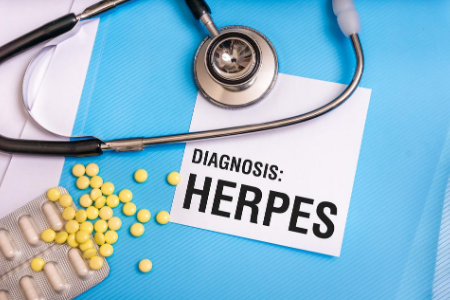Genital Herpes

The most common types of the Herpes virus are HSV-1 and HSV-2. Generally speaking HSV-1 causes cold sores on your mouth and HSV-2 causes the same type of cold sores on your genitals. It is not unusual to have HSV-1 on your genitals and HSV-2 on your mouth because oral sex is a mode of transmission and people generally do not use condoms while having oral sex. Viruses can affect anyone. These viruses don’t just affect prostitutes or sexually promiscuous people. They affect anyone - including doctors, nurses, judges and lawyers. Condoms help prevent herpes but are not 100%. The only way to be sure you never get it is to never become sexually active - which is not a choice many people make in life. Millions of people have contracted and continue to get infected every day. Infection is even possible with condoms (but it is decreased). It is also possible to transmit the virus to a partner when the virus is not symptomatic - called asymptomatic shedding. Thus, if you are sexually active it is very rare to never come in contact with one of these viruses.
Incidence
In the US 30% of people have HSV 2 - that is over 50 million people. In addition in the US, 70% of people have HSV-1. It is more common to have it then not have it.
Transmission
You can get genital herpes by having vaginal, anal, or oral sex with someone who has the disease.
If you do not have herpes, you can get infected if you come into contact with the herpes virus in:
- A herpes sore;
- Saliva (if your partner has an oral herpes infection) or genital secretions (if your partner has a genital herpes infection);
- Skin in the oral area if your partner has an oral herpes infection, or skin in the genital area if your partner has a genital herpes infection.
- You will not get herpes from toilet seats, bedding, or swimming pools.
If you are in a relationship with a person known to have genital herpes, you can almost eliminate your risk of getting genital herpes if:
- Your partner takes an anti-herpes medication every day. This is something your partner should discuss with his or her health care provider. This decreases asymptomatic shedding.
- You avoid having vaginal, anal, or oral sex when your partner has herpes symptoms (i.e., when your partner is having an outbreak).
- You use a latex condom every time you have sex
How do I know if I have genital herpes
Most people who have genital herpes have no symptoms, or have very mild symptoms. You may not notice mild symptoms or you may mistake them for another skin condition, such as a pimple or ingrown hair. Because of this, most people who have herpes do not know it.
Herpes sores usually appear as one or more blisters on or around the genitals, rectum or mouth. The blisters break and leave painful sores that may take a week or more to heal. The first time someone has an outbreak they may also have flu-like symptoms such as fever, body aches, or swollen glands - this is called the prodrome. Many women complain of burning during urination. Women tend to get more more painful first outbreaks due to the vagina being mucosal tissue; whereas men have skin covering their penis - outbreaks are sometimes not noticed.
People who experience an initial outbreak of herpes can have repeated outbreaks. Repeat outbreaks are usually shorter and less severe than the first outbreak. Although the infection stays in the body for the rest of your life, the number of outbreaks may decrease over time.
Herpes and pregnancy
If you are pregnant and have genital herpes, it is very important for you to go to prenatal care visits. If you have ever had symptoms of, or have been diagnosed with genital herpes it is not likely this will affect your baby. Most of the concern is when you get herpes for the first time ever in your life when you are pregnant and if you have a vaginal outbreak during labor. Pregnancy is absolutely a time when blood HSV antibody tests help define concern for the baby. It is thought that antibodies called IGG can pass through the placenta and protect a baby from getting HSV from its mom. These antibodies are formed months after an initial infection. Herpes infection can be passed from you to your unborn child before birth but is more commonly passed to your infant during delivery. This can lead to a potentially deadly infection in your baby (called neonatal herpes). If you are pregnant and have genital herpes, you will be offered anti-herpes medicine towards the end of your pregnancy. This medicine may reduce your risk of having signs or symptoms of genital herpes at the time of delivery and is considered safe. At the time of delivery, you will be evaluated for herpes sores. If you have herpes symptoms at delivery, a ‘C-section’ is usually performed.
Can herpes be cured?
There is no cure for herpes. However, there are medicines that can prevent or shorten outbreaks. Anti-viral medicine can be taken daily, and makes it less likely that you will pass the infection on to your sex partner(s).
Herpes can be managed. Most people who have ever had sex get exposed to it at some point. Your health care provider can help you manage the symptoms and help you manage choices you make when you find out your partner has tested positive. It is really important to talk this through with your healthcare provider so the “stigma” can be removed.

SHARE